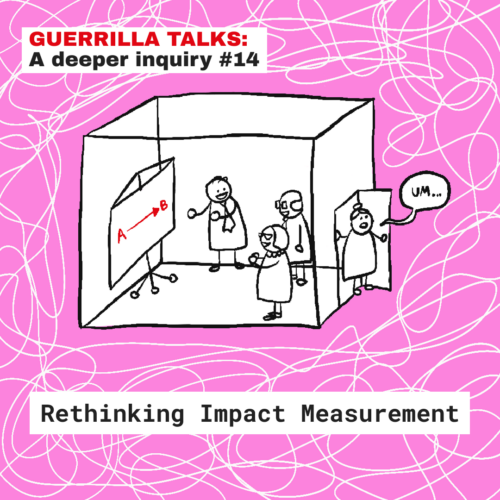* this article complements the Deeper Inquiry session on Feminisation of Politics organised by Guerrilla in June 2022. If you want to see the video instead of reading the piece, jump straight to the end of this article.
What we say and what we do
As children of societies of some sort of dissenting lineage, we radical activists oftentimes claim ourselves to be feminist, for today it’s perceived as a movement and an agenda needing to be claimed and addressed. We talk about feminism in our daily lives, we spread it across our activism. But are we really living by our feminist learnings as individuals? Can organisations really run up to the feminist principles they present? Despite mounting desire to transcend patriarchal ways of doing and being among progressive leftist groups, we must also come to realise there are numerous ways in which we aren’t serving the feminism we claim to have.
As a start, spotlighting the wrongs may shed light on how we can move past them. How many times have you noticed that some of us take longer to express our views in meetings? What about the confrontative discourses we breed, either inside or outside of our organisations? Are we welcoming diverse voices, or do we prefer the solo-uniting discourse that’s easy to chew? Do we acknowledge that we reward, with visibility, decision-making rights, and even with money, those activists who can dedicate more time and energy to our common work, ignoring that our life circumstances are very diverse? If only we would welcome more perspectives than our own, would we realise that some of us have different working styles, that some of us have caring responsibilities, and that we live under extreme repressive conditions, leading to various physical and psychological challenges impacting our lives.
Feminism is not an exercise to relativise all life circumstances, but more an open enquiry: is it really in our nature to be so confrontative, individualist? Are we naturally tending to antagonise, or is that a construct that, amongst other social pathologies, patriarchal heritage has made emerge in us? Perhaps not. So perhaps it is also the time to look at how we can flip the script to embody our feminisms. For every. Body.
Why?
First of all, as long as we don’t reflect and act upon feminist (and other inclusive) practices, it will be very hard to make politics and activism a place for everyone. We need to make sure that activism is not run by the logics of privilege and oppression if we want it to be open and attractive to everyone. We don’t want activism to be something that only an elite of middle class hyperactive white folks can engage with, for it would be missing out a whole lot.
But, second, incorporating feminism is also key if we want to “practice what we preach”. We can’t wait “until the time is right” to work on how we reproduce the rules of the systems that we want to dismantle. This time will never arrive.
Third, and most important, not tackling these issues affects our possibilities of long-term impact. Doing activism in patriarchal ways generates burnout, trauma, depression. We need to be happy, healthy, resilient activists if we want to be creative and brave. The challenges we face require us to support each other, to make decisions based on trust instead of fear, and to be aware of our interconnectedness. We need to address the macro-challenges basing our strength on our micro-relations because that is our main asset (since, obviously, big money, the military/police and influences are not on our side).
These are some of the big questions we need to ask ourselves: To what extent are we willing to let the feminist revolution permeate our individual actions, but also our organisational culture? Are we willing to unlearn what we know and what we feel comfortable with? Do we want to put energy into changing the way our organisations work, challenging entrenched practices in order to replace them with new ones? Do we have the patience to persevere in this path in spite of the adversities? Which strategies can we implement to make sure we include feminism in our agendas and keep it as a priority?
Feminisation of politics – what is it (and what is it not)?
To clear the way a little bit, let’s start with what it is not. We don’t think that making politics more feminist is merely a matter of gender balance, having female leaders or making sure feminist policies are implemented by political institutions. All these things are important and certainly part of the feminist agenda. But they can be achieved from within a patriarchal framework. We can achieve a really strict gender balance in many areas just by tokenising women. We can have female leaders who behave like men (and, when this is the case, who are often already privileged in many ways, compared to other women). We can have patriarchal institutions and organisations implementing feminist policies.
Feminising politics is not merely about being more feminine, nicer, or acting like traditional moms. These roles have been socially constructed and we don’t want to reinforce them. But more importantly, we want to look at what is valuable (or not) in these and other ways of doing and to see how they are distributed. If we manage to do that, and to see which ways of behaving are rewarded, we will take a first step towards more feminist ways of doing politics. That said, to some extent we do believe that having privileged men adapting to ways of doing that they do not find as comfortable can be important because, first, it’s fair (why should everyone else always adapt to patriarchal ideas which benefit the privileged instead of the opposite?) and, second, the ride will hopefully make men connect with the values that they also hold within (cooperation, listening, care, diversity, etc.). Moving beyond binaries and opening up to the universality of our interconnected nature.
But what is it, then? The feministisation of politics has to do with changing the formal and informal rules of the game. Changing structures, practices, decision-making mechanisms, discourses, communication strategies, relationships, times, priorities, etc. It’s about addressing privileges that are sustained by a patriarchal framework and working to dismantle them. In this sense, it is not so much about offering answers, but about asking the right questions, raising awareness and finding solutions together. Feminist practices have to become a cross-cutting issue that is present in everything we do as activists, and not merely a task for a bunch of feminist fundamentalists.
Finally, since feminist politics is concerned with privilege, it cannot be based on biological sex distictions. Privilege appears in many dimensions and different kinds of privilege (and the lack thereof) intersect and interplay in complex ways. These privileges need to be addressed on an ongoing basis in order to make politics a place for everyone, not only in words, but also in practice.
Feminism and new municipalism
In the last decade, many groups have been exploring and expanding the new or radical municipalist strategy, which intends to change the way politics are done by starting from the local level to deepen democracy. Municipalism has a long history in many places, but what is special about this recent movement is that it aims to bring together local public institutions, social movements and ordinary citizens to reshape the way they relate with each other. The goal is to dismantle the state-centred representative democracy system and to build power from the bottom up, not merely by following the typical pathways of social movements (protest, advocacy, mobilisation, awareness-raising, disobedience and prefiguration, among others), but, to some extent, by building a stronger democracy where the power flows up from the people to the government. Or, actually, ordinary people are expected to become the government. How this happens in practice, depends on the place. Sometimes collectives self-organise and support political candidates, sometimes they run as candidates to the local elections, either through a broad confluence of social actors or through an existing political party. Although municipalist groups tend to be horizontal and to work close to the local communities, strategies are very heterogeneous and adapted to the local circumstances.
There are many cross-pollinations between new municipalism and feminism. From a feminist point of view, a political strategy that focuses on buiding political power from the bottom up instead of relying on the patriarchal institutions of the state and the political party offers the opportunity to bring many elements of the feminist agenda to the political practice without remaining at the margins of mainstream politics. At the same time, new municipalism can strengthen its horizontal way of doing politics by learning from feminist practices, and it can catalyse the feminist wave of mobilisations from the last few years by offering a concrete political pathway to reinforce the feminist revolution.
Although municipalist organisations rub shoulders with feminist values, in practice their activists are just humans brimming with irrationality as all of us, and they are no less raised under patriarchy. So, it’s not surprising that the monkey brain gives in to patriarchal behaviour patterns. And this becomes worse the closer they get to traditional political institutions such as the local state, the media, the form of the political party.
There are challenges, but with the intention to unravel them, a few years ago, a network of municipalist feminist activists started meeting to exchange ideas and find roadmaps to deal with internal patriarchal structures. Activists – among whom we, writing this article – from different organisations realised that we were experiencing very similar blockages. Luckily, solidarity and mutual learning ushered our navigation of these challenges. Because feminising politics is more about asking the right questions than offering answers, the work of the network started by writing a questionnaire that each organisation could use as a self-assessment. We organised a set of meetings, researches, publications and events, even a MOOC course! But the main aim of our collective remained to keep converging, unveil the issues and create spaces to share. In fact, the actual work has been the rippling effect this convergence has generated inside each of our municipalist organisations.
Just like a panthora box (one of panthers), the work of this group imbued a feminist vision as it made sense of the different areas covered by the feminisation of politics. The process led us to identify different working areas in the field: care, power, diversity, non-violence, resources, democracy, and leadership. It is an open list and their divisions are blurry, so if we need to hammer at two of the elements that appear more often in discussions about feminist politics, let us delve into power and care.
Power
Often we activists avoid discussions about power, as stinky fish that’s masked under someone else’s shadows. As if it was something that others had, but shouldn’t; something dangerous and able to distort movements’ aims. But that is shying away from our very nature, isn’t it? We do want power. We want ordinary people to have power. More importantly, the problems with power and how it can corrupt are intimately connected to a specific view about power where it is a resource that can be appropriated (either you have the power or I have it) and/or it is exercised by some over others. According to this patriarchal reading, power is a zero-sum game that we individually need to compete for.
Feminist readings of power are different. Here, it is seen as something that we exercise with others, through collaboration and cooperation. It is something that we exercise collectively and the more we empower others the more power we create. Like love, in this view, the total amount of power can be multiplied the more we share it with others. Confrontation is not the mechanism through which power is obtained and feminising power means sharing and creating capacity, incentivising collaboration, nurturing ecosystems and abandoning confrontational discourses and strategies (often even with our opponents!). This doesn’t mean being naive or stupid. We can still clearly identify the root causes of injustice, point at them, and do our best to change reality. But we don’t need to see our work in terms of a war that we need to win or enemies we need to destroy. We can multiply power by inspiring, sharing and being smart and creative together.
So, you may ask, what does this mean in practice? Basing our action on trust instead of fear is a first step. Listening to others (both inside and outside our organisations), paying attention to different voices. Appease discussions instead of fueling them. It means acknowledging conflict and the pain it can generate and finding ways to process it so we can learn. Sharing responsibilities, our precious contacts or our valuable info with our peers instead of keeping them secluded. Making decisions in formal open collective spaces instead of informal ones. Experimenting with non-confrontative discourses, both inside and outside our organisations while being clear about the root causes of injustice. Expressing our goals in terms of the futures we imagine instead of ranting about the wrongs of the present and future. Promoting decentralised and cooperative forms of leadership that include questions and problems involving everyone instead of offering solutions that others will follow/implement. And hey, remember, building collective power is a slow process and it is not something we can quickly steal from someone else.
Care
Often caring responsibilities are either invisibilized within our organisations or implicitly seen as a female task. No organisation can survive without a minimum amount of care work and many feminists believe that our political action should also be guided by an ethics of care. Some of us just don’t see it or don’t practise it that often. Care can take different forms and require different resources and skills, depending on who is the destinatary.
First of all, there is the care we need to have for our fellow activists and peers. Activist organisations do not only have to be effective and produce outputs; they need to reproduce themselves. Every organisation is based on relationships that need to have continuity and they need to keep their activists instead of losing them, but also engage new people in order to be sustainable. Moreover, organisations need to have happy activists who can explore their creative potential, and this only happens in a context of safety and happiness. All of this requires a lot of care that is usually very unevenly distributed, becoming a burden that only some people carry. But there are many ways to prioritise care, for instance, by institutionalising certain practices that create bonds between people (like sharing fun activities, etc.), creating mechanisms to process tension and conflict (like caring groups, mediation teams, etc.), having protocols to take care of people who are going through difficult situations or cases of violence, creating safe spaces, etc. All of this, while making sure that it is not the usual suspects who make these things happen: it’s everyone’s responsibility.
Second, some people hold external caring responsibilities (they are in charge of dependent beings such as children, animals, disabled people, elderly people, etc.) and in order to fully participate in activist projects or organisations, they need additional support. Organisations need to take care of the carers or they will risk becoming ruled by people who are not used to paying attention to the needs of others. In practice, this means that more resources need to be used to support carers, but also that care work should be more evenly distributed (for example, by creating collective spaces where children or animals can be taken care of, or using collective resources to support those who have to take care of the elderly or the disabled).
Finally, there is the kind of care that is trendy (but also often misunderstood) nowadays: self-care. We’re not talking about bubble baths and candles (although those are massively soul warming and soothing, too!). Our activism often leads to stress, burnout and trauma and this is a big obstacle for the sustainability of our political projects. On the one hand, at an individual level, we activists are often not used to setting boundaries, resting enough, eating well, having enough leisure time, etc. On the other hand, this goes beyond ourselves to become a collective issue: we are part of a (activist) culture where people are rewarded for doing as much as they can and criticised when they don’t. And we all contribute to that culture of limitless productivity in many ways. Since self-care has this double dimension (individual and collective), we need to address it from both sides. We need to take our well-being very seriously, not only by making sure we stay mentally and physically healthy but we arguably have the responsibility to broaden our window of tolerance and become more resilient through moving our bodies, meditation, therapy, or whatever it is that helps us become stronger. And we also need to collectively flag these issues and make sure we don’t contribute to a culture of burnout but foster a culture of self-care. Our organisations can develop clear rules in this domain, like limiting the duration of meetings, limiting working hours, facilitating resources for self-care (information, meditation sessions, psychological support), training and awareness raising, etc.
It is too hard to even start
Feminising politics is not an easy task. We’re often immersed in patriarchal logics, and applying a feminist lens in all we do is a very difficult task. On top of that, we have different political cultures in different countries, which makes everything even harder. In some places it’s not even possible to talk about feminism without having to listen to some men complaining that they feel attacked. The strategies to bring these issues to the table or to embark in deeper work will vary from place to place. Also, the solutions to the fundamental questions will probably be different and will change over time.
A very common question, then, is: how to take the first step? An easy answer would be to say “well, it depends on your circumstances. Just figure it out by yourselves”. But our convergence in this network has given us a set of general ideas that can also guide this process.
As you open up to enquire, start with the self-assessment. You can create your own or copy/adapt the one we’ve been developing if you want. Sometimes talking about these issues is a bumpy ride and opening up collectively and individually to reflect and share can be a start. Remember, you’re not alone and seeking support from a broader network or an external organisation may guide the process too, and legitimise the discussion.
Another useful suggestion is to create a group of committed people within your organisation. We can’t expect everyone to be engaged in these issues, at least certainly not at the beginning. In practice we need a group of very committed people who can give continuity to the project of feminising practices. This group could be, not only a working environment, but also a safe space where we can find support, because often raising these issues within an organisation can generate a lot of backlash. If that is the case, never go into the fight alone.
Finally, if this is a possibility for you, create bonds of solidarity with feminist activists in other organisations, ask for support to feminist groups, look for information online, etc. Anything that makes you feel you’re not a bunch of crazy heads complaining about details when your organisation has much more important work to do. You are certainly much more than that and making our activism more feminist is certainly a top priority.
If this all sounds exciting to you and you want to be in touch with the Feminisitisation of Politics Collective, write us at: info@municipalisteurope.org.




